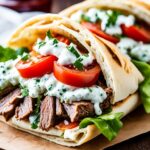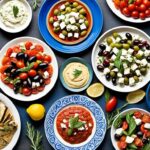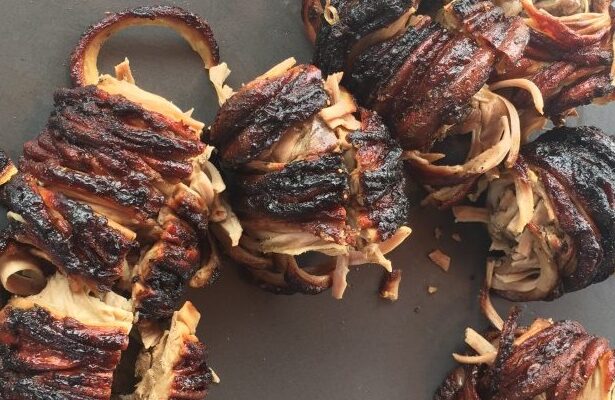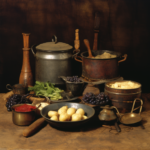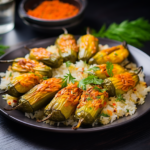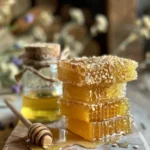kokoretsi Introduction
Greek Easter Kokoretsi is an iconic Greek dish that embodies the spirit of festive gatherings and traditional cooking methods. Typically served during major celebrations like Easter, kokoretsi is cherished not just for its flavors but also as a part of the culinary heritage that brings families together.
This recipe will guide you through making your own kokoretsi, ensuring a taste of Greece right from your backyard.
Ingredients
- 3 kg mixed lamb offal (heart, lungs, liver, and kidneys), cleaned and chopped
- 2-3 lamb intestines, thoroughly washed to serve as casing
- 200g sweetbreads
- 3-4 garlic cloves, finely chopped
- 1 bunch of fresh thyme
- 1 bunch of fresh oregano
- Salt and freshly ground black pepper
- Olive oil
- 100 ml white wine
- Lemons for serving
Greek Easter Kokoretsi Preparation Steps
- Prepare the Offal:
- Begin by thoroughly cleaning the offal. Soak in cold water, changing the water several times, then drain.
- In a large bowl, marinate the offal with garlic, thyme, oregano, salt, pepper, and a generous amount of olive oil. Let it marinate for at least two hours, or overnight for enhanced flavor.
- Prepare the Intestines:
- Clean the intestines by running them under cold water and using salt as an abrasive to ensure they are completely clean.
- Soak them in a mixture of vinegar and water for an hour to help reduce any strong odors.
- Assemble the Greek Easter Kokoretsi:
- Skewer the larger pieces of offal onto a large spit. Intertwine the pieces closely together.
- Wrap the marinated intestines around the skewered offal tightly, ensuring to cover all the meat. This will keep the juices sealed in during the cooking process.
- Cooking:
- Prepare your grill for medium to high heat. Place the spit across the grill and start roasting, turning frequently for even cooking.
- Occasionally baste with a mixture of olive oil and white wine to keep the meat moist and flavorful.
- Cook for about 3-4 hours, depending on the heat and size of the kokoretsi.
- Serving:
- Once cooked, remove from the spit and let it rest for about 10 minutes.
- Slice into rounds and serve hot, accompanied by freshly squeezed lemon juice and perhaps a side of tzatziki sauce.
kokoretsi Conclusion
Greek Easter Kokoretsi is not just food; it’s a celebration of life and tradition. This dish, with its robust flavors and communal cooking style, brings people together in a way that few other dishes can. Whether you’re a seasoned kokoretsi maker or a curious food enthusiast, this recipe promises an authentic experience of Greek festivity.
Enjoy making and sharing this traditional Greek kokoretsi at your next gathering!
Certainly! Here’s a FAQ section that could accompany the blog post about cooking Greek Kokoretsi, aimed at addressing common questions readers might have about this traditional dish.
FAQ: Greek Easter Kokoretsi, Greek Easter Recipes
Q1: What is kokoretsi made of? A1: Kokoretsi is made from a mix of lamb offal, which includes the heart, lungs, liver, and kidneys, seasoned with herbs and wrapped in lamb intestines before being roasted on a spit.
Q2: How do I clean the intestines properly? A2: To clean the intestines, rinse them thoroughly under cold water, using salt as an abrasive to remove any residue. Afterward, soak them in a mixture of vinegar and water for about an hour to help remove any odors.
Q3: Is there a vegetarian alternative to kokoretsi? A3: While kokoretsi is traditionally made with meat, a vegetarian version could involve using a variety of vegetables and mushrooms, seasoned and wrapped in grape leaves or cabbage, then grilled to achieve a similar texture.
Q4: How long does it take to cook kokoretsi? A4: Cooking time for kokoretsi can vary depending on the size and how densely the meat is packed, but generally, it takes about 3-4 hours of roasting on a spit over medium-high heat.
Q5: Can kokoretsi be prepared in advance? A5: You can prepare and marinate the offal and clean the intestines a day ahead. However, kokoretsi is best cooked and eaten fresh to enjoy its full flavor and texture.
Q6: What should I serve with kokoretsi? A6: Kokoretsi is traditionally served with lemon wedges, tzatziki sauce, and plenty of fresh, crusty bread. A simple Greek salad also pairs well with the rich flavors of kokoretsi.
Q7: How do I ensure the kokoretsi is cooked evenly? A7: Ensure the spit is rotated regularly and consistently during cooking. This helps the kokoretsi cook evenly on all sides and prevents any part from being under or overcooked.
Q8: Is kokoretsi safe to eat given it’s made with offal? A8: Yes, kokoretsi is safe to eat as long as the offal is fresh, thoroughly cleaned, and the dish is cooked to a safe internal temperature. Make sure all parts are well-cooked before serving.
Q9: Can kokoretsi be made using other types of meat? A9: Traditionally, kokoretsi is made using lamb offal, but variations might include using organs from other types of meat like goat. The key is to use fresh, suitable quality offal for the best results.
Q10: How do I store leftover kokoretsi? A10: Leftover kokoretsi can be covered and refrigerated for up to 2-3 days. Reheat it thoroughly in the oven or on the grill before serving to maintain its texture and flavors.
Welcome to Chef on a Bike, your haven for exploring the rich culinary tapestry of Greece. Our platform blooms as a vibrant community where the zest for Greek culinary traditions finds its home. As you venture into our culinary abode, you’re embraced by the love for hearty Greek meals, the tantalizing aroma of fresh herbs, and the camaraderie that’s synonymous with sharing a meal. Our mission is eloquent in its simplicity yet resonates profoundly; forging a nexus between the novice and seasoned cook, intertwining age-old traditions with fresh culinary narratives, and creating a sanctuary where every Greek cuisine aficionado finds solace in the comforting arms of a Greek kitchen.


